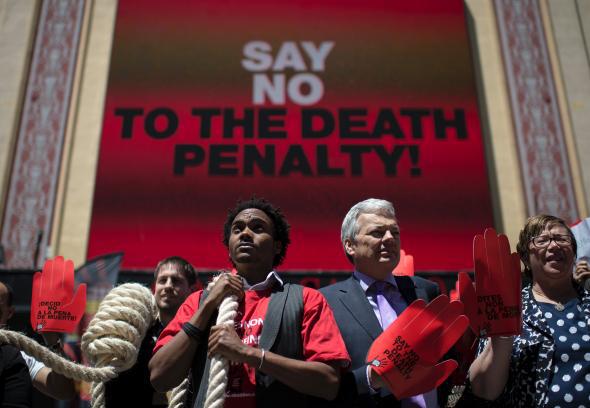The debate over concealment of state-sanctioned killing has moved on to another “pro-life” state.
Last week, the venue was Texas. There, the state Department of Criminal Justice refused a request from the Associated Press to disclose the pharmacy that supplied the state with drugs for lethal injections.
Now the controversy has spread to Oklahoma. Two men slated to die have sued the state to find out where the drugs for their executions are coming from. They say they’re entitled to know because Oklahoma and other states, facing difficulty in obtaining lethal drugs, have been improvising their formulas and turning to pharmacies that compound the chemicals on request. This coincides with two recent executions in which one inmate said, “I feel my whole body burning,” and another “made gasp-like sounds for several minutes.”
Nobody has proved a connection between these incidents and the improvised drugs. And nobody can, as long as the states conceal their suppliers.
In Texas, the Criminal Justice Department has to explain why this information is exempt from the state’s open records law. That question will be addressed in a court hearing today. But in Oklahoma, the state’s suppliers are kept secret by law. Rule 22-1015 (B) of Oklahoma’s code of statutes declares:
The identity of all persons who participate in or administer the execution process and persons who supply the drugs, medical supplies or medical equipment for the execution shall be confidential and shall not be subject to discovery in any civil or criminal proceedings.
That’s incredibly airtight. Never mind stonewalling the press. Even if you’re the lawyer for a person scheduled to die, you’re prohibited from finding out who’s cooking up his injection.
Two weeks ago, after attorneys for two Oklahoma inmates challenged this rule, the Department of Corrections dismissed their objection. “Regardless of what Plaintiffs discover about the protocol, their death sentence will not change,” the department argued in its reply brief. (You can download the brief here, but only as a huge picture file.) “The protocol challenges merely determine whether the sentence will be carried out in a different manner.” Furthermore, the brief added, “The most that Plaintiffs can muster is that executions ‘may’ result in cruel and unusual punishment. This is a baseless speculation without any proof … ”
That’s a remarkably casual attitude, coming from a state that works zealously to identify abortion providers, publicize their methods, and regulate the risks and alleviation of pain.
Rule 63-1-738.2 of the Oklahoma code (you can find the complete text of the state’s abortion laws here) stipulates that any woman who receives an abortion must first be told “the name of the physician who will perform the abortion.” Rule 63-1-738.9 says that if the fetus is at least 20 weeks past fertilization, the doctor must “inform the female if an anesthetic or analgesic would eliminate or alleviate organic pain to the unborn child caused by the particular method of abortion.” Rule 63-1-745.6 requires the doctor to report to the state “the method used for the abortion.” Rule 63-1-738m adds that
each year, the Department shall issue, on its stable Internet website, a public Annual Abortion Report … [showing] the number of abortions performed by each reported method … the number of cases in which anesthesia was administered to the mother and the number of each type of anesthesia; the number of cases in which anesthesia was administered to the unborn child, and the number of each type of anesthesia and of each method of administration … the number of abortions performed without surgery but rather as the result of the administration of chemicals … [and] the number of abortions performed for each hospital at which the abortionist had hospital privileges …
That’s a lot of information. It’s not just being disclosed on request. It’s being posted online, by law, for everyone to see. Even the patient’s identity isn’t fully protected. Under Rule 63-1-738.16, courts are authorized to decide, case by case, “whether the anonymity of any female upon whom an abortion has been performed or attempted shall be preserved from public disclosure.” Suppressing that information is permitted only when “no reasonable, less restrictive alternative exists.”
In short, Oklahoma thinks it’s more important to protect the identity of a company that supplies execution drugs than to protect the identity of a woman who gets an abortion.
Why? Because Oklahoma worries that pro-lifers—the ones who believe life is sacred even after it’s born—will target the drug suppliers. In its coverage of the death-penalty litigation, the Oklahoman reported yesterday:
Assistant Attorney General John Hadden argued much of the concern over the drugs is speculation. He said the sources need to be kept secret to protect their safety. Hadden pointed to threats of violence made to compounding pharmacies by anti-death penalty activists. “We’re talking about people who are willing to send in bomb threats to compounding pharmacies.”
That’s the same argument we heard in Texas. States that have never worried much about harassment of abortion clinics suddenly become concerned when the targets are pharmacies that sell execution drugs.
The judge in Oklahoma didn’t buy this argument. “The secrecy statute is a violation of due process because access to the courts has been denied,” she ruled. The state is appealing her decision, but either way, the debate won’t end here. The AP says at least two other states, Arkansas and Missouri, also suppress information about how they do their executions.
That’s four states, all of them hostile to abortion. They call themselves pro-life. Are they?
